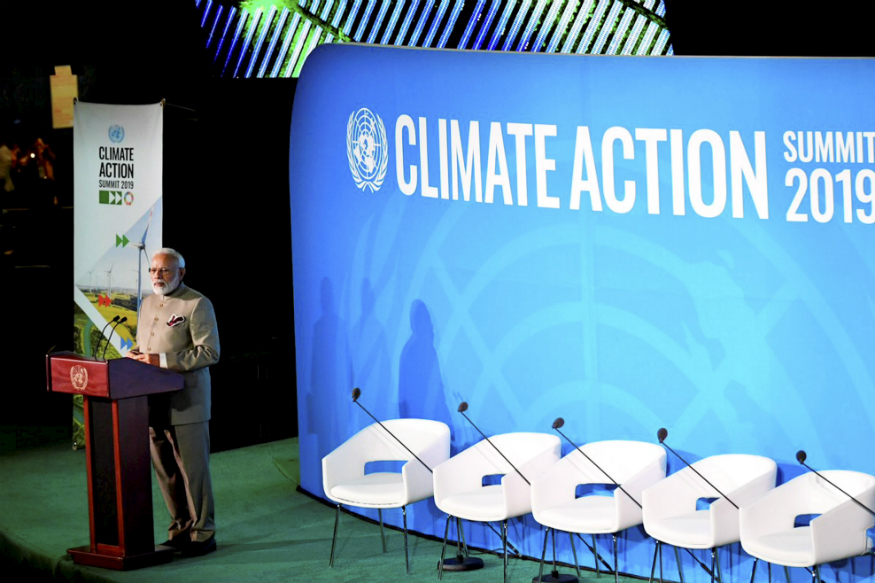NEW DELHI: Environmental experts Monday cautiously welcomed Prime Minister Narendra Modi’s pledge to double India’s renewable energy target to 450 gigawatts, saying while his aim was “ambitious”, its implementation may not be easy. Speaking at the UN Climate Action Summit in New York, Modi gave a clarion call for a “global people’s movement” to bring about a behavioral change to deal with climate change as he made a path-breaking pledge to more than double India’s non-fossil fuel target to 450 gigawatts.
Reacting to his speech, environmentalist Chandra Bhushan said the prime minister has given a “positive roadmap” for India, saying 450 gigawatts target was the most ambitious one set so far.
“The prime minister has given a very positive and ambitious roadmap for India to tackle climate change. The pledge of increasing renewable energy capacity to 450 GW means the PM is serious about reducing the carbon emissions. 450 GW is the most ambitious target ever set,” Bhushan said. However, some environmentalists felt that renewable energy was costly and achieving the set target might not be easy.
“The move to increase non-fossil fuel is very good. I appreciate his speech. But we are yet to see how will it be done and where will the funds be raised from as renewable energy is costly. His plan seemed ambitious,” NGO Social Action for Forests and Environment founder Vikrant Tongad said, adding that its implementation is to be seen.
Another environment activist and advocate, Gaurav Bansal, however, opined differently, saying the need of the hour was to ensure that the renewable energy does not harm the environment.
“Instead of blindly making target of increasing renewable energy, government must look into the concern that it does not harm the environment. Renewable energy can be used to generate electricity and according to recent reports, power lines have become the reason for killing several species of birds. Implementation of the highly ambitious target is also to be seen,” he said.
In his short speech, Modi also talked about his government’s ambitious ‘Jal Jeevan Mission’ for water conservation, rainwater harvesting and for the development of water resources, saying said India will spend USD 50 billion on the project in the next few years. In his Independence Day speech last month, the Prime Minister pledged to spend Rs 3.5 lakh crore on ‘Jal Jeevan Mission’.
Reacting to this, environmental experts said water crisis was already existent in the country and an investment like this was required.
“The PM’s aim to spend USD 50 billion for water conservation shows how serious he and the country is about the impact of climate change,” Bhushan said. Expressing similar views, Tongad said, “Water crisis is real and existent in India and it requires urgent attention. So far Jal Shakti Abhiyaan has not done much but the PM’s initiative to make such a huge investment is praise worthy. We have to see from where the funds will be drawn.”
In his first engagement at the United Nations, Modi noted that various efforts are being made by different countries to fight climate change and said what is needed today is a comprehensive approach which covers everything from education to values, and from lifestyle to developmental philosophy.
“The time for talking is over. The world needs to act now,” Modi asserted. India is also focusing on the use of compressed biogas and his government has provided clean cooking gas to 150 million families, thus improving the health of the environment, of women and children. PTI







